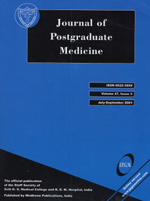
|
Journal of Postgraduate Medicine
Medknow Publications and Staff Society of Seth GS Medical College and KEM Hospital, Mumbai, India
ISSN: 0022-3859 EISSN: 0972-2823
Vol. 51, Num. 2, 2005, pp. 89-90
|
Journal of Postgraduate Medicine, Vol. 51, No. 2, April-June, 2005, pp. 89-90
Expert's Comments
A call to engagement
Egnew T.R.
Department of Family Medicine, University of Washington School of Medicine, Seattle, Washington
Correspondence Address: Department of Family Medicine, University
of Washington School of Medicine, Seattle, Washington, Email: thomas.egnew@multicare.org
Code Number: jp05033
Effective communication is essential to quality medicine and therefore receives considerable research attention in the developed world. Studies have detailed four common, important dimensions of medical communication: clarity of information provided to the patient, mutual goals, an active patient role, and a warm, supportive, empathetic physician.[1]
Yet, little is known about medical communication in developing countries. This issue of the Journal includes a study that addresses this void. Avan et al have surveyed the perceptions of Pakistani resident physicians regarding their performance of key medical communication tasks.[2] A study of perceptions reveals little about the residents′ actual competence to perform the tasks surveyed. It does, however, provide valuable insights into the residents′ confidence in their communication skills.
Understandably, residents from the multidisciplinary cohort-anesthesiology, radiology, and pathology-scored lower than residents in other cohorts on the informative and affective communication tasks surveyed. These specialties entail less direct, prolonged patient contact and require less need to understand the psychosocial status of patients. Abbreviated patient contact plausibly hinders communication skills development. Residents selecting these specialties may also be less interested in or comfortable with these communication domains.
The most interesting finding involved the residents′ confidence in communicating with professional colleagues. All resident cohorts reported strikingly lower scores on this scale. Three of four study cohorts gave professional communication approximately half their average ratings for the other communication domains. The residents perceived barriers to asking questions, establishing dialogue with seniors, offering suggestions, participating in clinical presentations, and encouraging colleagues′ conscientious performance. The authors attribute these results to the cultural context of the residencies surveyed. Still, what are the implications for training when residents are less confident about relating to colleagues than patients?
A learning environment that discourages communication promotes a considerably
more passive resident role than is typical in developed countries. Optimal
communications training involves personal attention, delineation and
definition of necessary skills, and repeated observation with feedback
and discussion. As residents′ clinical personalities emerge during training, they are particularly open to acquiring effective communication skills.[3] But
they must be guided through the process, engaged in dialogue with seniors
and peers to explore, in an environment where they are not defending
themselves from critique, the struggles that regularly challenge the
very nature of their work.[4],[5] Avan
and associates provide evidence that Pakistani residencies have yet to
develop these characteristics. As such, their study may say less about
the residents surveyed than the training programs educating them.
REFERENCES
| 1. | Stewart M, Brown JB, Boon H, Glajda J, Meredith L, Sangster M. Evidence on patient-doctor communication. Cancer Prevent Control 1999;3:25-30. Back to cited text no. 1 |
| 2. | Avan BI, Raza SA, Afridi S. Communication skills of residents in postgraduate medical training programs of Pakistan. J Postgrad Med 2005;51-85-9. Back to cited text no. 2 |
| 3. | Smith RC, Lyles JS, Mettler J, Stoffelmayr BE, Van Egeren LF, Marshall AA, et al. The effectiveness of intensive training for residents in interviewing. Ann Intern Med 1998;128:118-26. Back to cited text no. 3 |
| 4. | Inui TS. A flag in the wind: educating for professionalism in medicine. Washington (DC): Association of American Medical Colleges;2003. Back to cited text no. 4 |
| 5. | Cassell CJ. Doctoring: the nature of primary care medicine. New York: Oxford University Press;1997. Back to cited text no. 5 |
Copyright 2005 - Journal of Postgraduate Medicine
|
